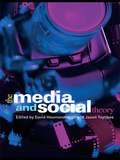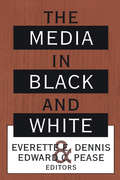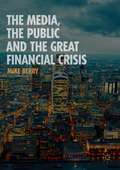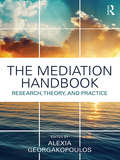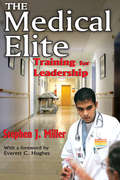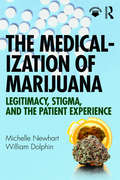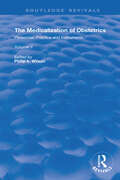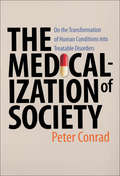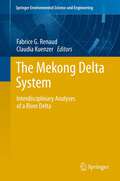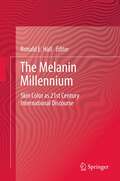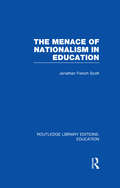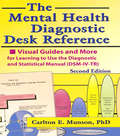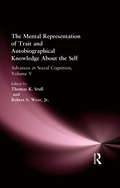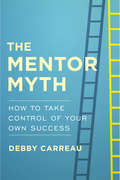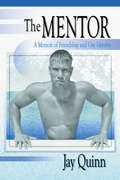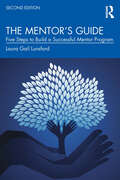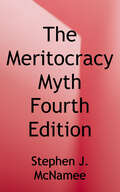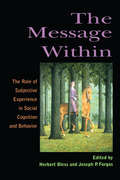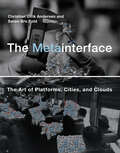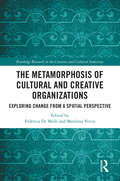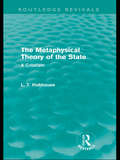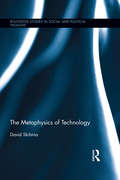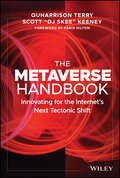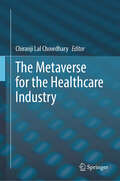- Table View
- List View
The Media and Social Theory (CRESC)
by David Hesmondhalgh Jason ToynbeeMedia studies needs richer and livelier intellectual resources. This book brings together major and emerging international media analysts to consider key processes of media change, using a number of critical perspectives. Case studies range from reality television to professional journalism, from blogging to control of copyright, from social networking sites to indigenous media, in Europe, North America, Asia and elsewhere. Among the theoretical approaches and issues addressed are: critical realism post-structuralist approaches to media and culture Pierre Bourdieu and field theory public sphere theory – including post-Habermasian versions actor network theory Marxist and post-Marxist theories, including contemporary critical theory theories of democracy, antagonism and difference. This volume is essential reading for undergraduate and postgraduate students and researchers of cultural studies, media studies and social theory.
The Media in Black and White
by Everette E. DennisThe media's treatment of and interaction with race, like race itself, is one of the most sensitive areas hi American society. Whether hi its coverage and treatment of racial matters or racial connections inside media organizations themselves, mass communication is deeply involved with race. The Media in Black and White brings together twenty journalists and scholars, of various racial backgrounds, to grapple with a controversial issue: the role that media industries, from advertising to newspapers to the information superhighway, play in helping Americans understand race.Contributors include Ellis Cose, a contributing editor for Newsweek; Manning Marable, chairman of Columbia University's African-American Research Center; William Wong, a columnist for the Oakland Tribune; Lisa Penaloza, a University of Illinois professor; and Melita Marie Garza, a Chicago Tribune reporter. Among the topics discussed are: the quality of reporting on immigrant issues; how sensationalism may be deepening the chasm of misunderstanding between the races; how the coverage of America's drug wars has been marked by racism; and whether politically correct language is interfering with coverage of vital issues and problems.The contributors of The Media in Black and White hope to broaden the narrow vision of the United States and the world beyond with their contributions to the debate over race and the media. The commentary found hi this important work will be of interest to sociologists, communication specialists, and black studies scholars.
The Media, the Public and the Great Financial Crisis
by Mike Berry<p>This book explores the impact of the print and broadcast media on public knowledge and understanding of the 2008 Great Financial Crisis. It represents the first systemic attempt to analyse how mass media influenced public opinion and political events during this key period in Britain's economic history. To do this, the book combines analysis of media content, focus groups with members of the public and interviews with leading news journalists and editors in order to unpack the production, content and reception of economic news. <p>From the banking crisis to the debate over Britain's public deficit, this book explores the key role of the press and broadcasting in shaping public understanding and legitimating austerity through both short and long term patterns of media socialisation.</p>
The Mediation Handbook: Research, theory, and practice
by Alexia GeorgakopoulosThe Handbook of Mediation gathers leading experts across fields related to peace, justice, human rights, and conflict resolution to explore ways that mediation can be applied to a range of spectrums, including new age settings, relationships, organizations, institutions, communities, environmental conflicts, and intercultural and international conflicts. The text is informed by cogent theory, state-of-the-art research, and best practices to provide the reader with a well-rounded understanding of mediation practice in contemporary times. Based on four signature themes—contexts; skills and competencies; applications; and recommendations—the handbook provides theoretical, applicable, and practical insight into a variety of key approaches to mediation. Authors consider modern conflict on a local and global scale, emphasizing the importance of identifying effective strategies, foundations, and methods to shape the nature of a mediation mindfully and effectively. With a variety of interdisciplinary perspectives, the text complements the development of the reader’s competencies and understanding of mediation in order to contribute to the advancement of the mediation field. With a conversational tone that will welcome readers, this comprehensive book is essential reading for students and professionals wanting to learn a wide range of potential interventions for conflict.
The Medical Elite: Training for Leadership
by Stephen MillerIn the tradition of C. Wright Mills, Stephen J. Miller defines and analyzes the power of the medical elite in American elite. He describes a group of interns who are becoming the successors of the physicians who determine the character of medicine in a complex society. The group is at the Harvard Medical Unit of the Boston City Hospital, and its members are heirs apparent to the elite of the medical profession.Miller spent more than a year living with these interns. He observed them as they worked on the wards, in clinics, and on the accident floor. He interviewed interns, administrators, teachers, researchers, and other personnel at the university-affiliated hospital. He describes how members of the elite are chosen and promoted, discusses what makes them elite, and demonstrates how they maintain their elite status. In the course of his analysis he describes fully the training of these young physicians and how their internship prepares them for the future role in medicine. The thrust of the book is to document the training of interns in a big-city hospital and to describe the operations and self-perpetuating tactics of elite.The best or the elite of the medical profession, explains Miller, are teachers and researchers at medical schools and particularly those at "name" schools and their affiliated hospitals. More than half of those who served in the internship program went on to become professors, deans, chairmen, and administrators in those institutions. The author describes how interns serve the purpose of the elite they may someday join: they provide the bulk of the medical care at the hospital and, by so doing, free the researchers so that they are able to spend more time in the laboratory. While much of what interns do is everyday tasks of caring for patients, those who serve such internships are taking the first step on a route that leads to membership in the medical elite
The Medicalization of Marijuana: Legitimacy, Stigma, and the Patient Experience
by Michelle Newhart William DolphinMedical marijuana laws have spread across the U.S. to all but a handful of states. Yet, eighty years of social stigma and federal prohibition creates dilemmas for patients who participate in state programs. The Medicalization of Marijuana takes the first comprehensive look at how patients negotiate incomplete medicalization and what their experiences reveal about our relationship with this controversial plant as it is incorporated into biomedicine. Is cannabis used similarly to other medicines? Drawing on interviews with midlife patients in Colorado, a state at the forefront of medical cannabis implementation, this book explores the practical decisions individuals confront about medical use, including whether cannabis will work for them; the risks of registering in a state program; and how to handle questions of supply, dosage, and routines of use. Individual stories capture how patients redefine and reclaim cannabis use as legitimate—individually and collectively—and grapple with an inherently political identity. These experiences help illustrate how stigma, prejudice, and social change operate. By positioning cannabis use within sociological models of medical behavior, Newhart and Dolphin provide a wide-reaching, theoretically informed analysis of the issue that expands established concepts and provides new insight on medical cannabis and how state programs work.
The Medicalization of Obstetrics: Personnel, Practice and Instruments (Childbirth: Changing Ideas And Practices In Britain And America 1600 To The Present Ser. #2)
by Philip K. WilsonFirst published in 1996. Childbirth: Changing Ideas and Practices is intended to pro-vide readers with key primary sources and exemplary historio-graphical approaches through which they can more fully appreciate a variety of themes in British and American childbirth, mid-wifery, and obstetrics. The articles in this series are designed to serve as a resource for students and teachers in fields including history, women’s studies, human biology, sociology, and anthropology. They will also meet the socio-historical educational needs of pre-medical and nursing students and aid pre-professional, allied health, and midwifery instructors in their lesson preparations.
The Medicalization of Society: On the Transformation of Human Conditions into Treatable Disorders
by Peter ConradOver the past half-century, the social terrain of health and illness has been transformed. What were once considered normal human events and common human problems—birth, aging, menopause, alcoholism, and obesity—are now viewed as medical conditions. For better or worse, medicine increasingly permeates aspects of daily life.Building on more than three decades of research, Peter Conrad explores the changing forces behind this trend with case studies of short stature, social anxiety, "male menopause," erectile dysfunction, adult ADHD, and sexual orientation. He examines the emergence of and changes in medicalization, the consequences of the expanding medical domain, and the implications for health and society. He finds in recent developments—such as the growing number of possible diagnoses and biomedical enhancements—the future direction of medicalization. Conrad contends that the impact of medical professionals on medicalization has diminished. Instead, the pharmaceutical and biotechnical industries, insurance companies and HMOs, and the patient as consumer have become the major forces promoting medicalization. This thought-provoking study offers valuable insight into not only how medicalization got to this point but also how it may continue to evolve.
The Mekong Delta System
by Claudia Kuenzer Fabrice G. RenaudThis book about the Mekong Delta presents a unique collection of state-of-the-art contributions by international experts from different scientific disciplines about the characteristics and pressing water-related challenges of the Mekong Delta in Vietnam. The Mekong Delta belongs to one of the areas, which are to expect the largest challenges concerning environmental change and climate change induced sea level rise . The Delta acts as the "rice bowl" of Southeast Asia and is home to over 17 Million people, who need to cope with ecologic as well as socio-economic changes linked to the rapid economic development of the country. Annual floods, severe droughts, salt water intrusion, degrading water quality, tropical cyclones, hydrologic changes due to hydropower projects in the upstream of the Mekong, coastal erosion, and the loss of biodiversity are some of the problems in the region. Heterogeneous resource management responsibilities, and the fact that the Mekong - and thus also the Delta - is influenced by six countries aggravate the situation. Integrated water resources management and fostered cooperation and information exchange are pressing needs for the sustainable development of the Delta.
The Melanin Millennium
by Ronald E. HallIn the aftermath of the 60s "Black is Beautiful" movement and publication of The Color Complex almost thirty years later the issue of skin color has mushroomed onto the world stage of social science. Such visibility has inspired publication of the Melanin Millennium for insuring that the discourse on skin color meet the highest standards of accuracy and objective investigation. This volume addresses the issue of skin color in a worldwide context. A virtual visit to countries that have witnessed a huge rise in the use of skin whitening products and facial feature surgeries aiming for a more Caucasian-like appearance will be taken into account. The book also addresses the question of whether using the laws has helped to redress injustices of skin color discrimination, or only further promoted recognition of its divisiveness among people of color and Whites. The Melanin Millennium has to do with now and the future. In the 20th century science including eugenics was given to and dominated by discussions of race category. Heretofore there remain social scientists and other relative to the issue of skin color loyal to race discourse. However in their interpretation and analysis of social phenomena the world has moved on. Thus while race dominated the 20th century the 21st century will emerge as a global community dominated by skin color and making it the melanin millennium.
The Menace of Nationalism in Education (Routledge Library Editions: Education)
by Jonathan Scott FrenchWritten between the two World Wars this volume examines education from the American, British, French & German perspectives and the degree to which the portrayal of those countries in school textbooks contributes to nationalism or world peace.
The Mental Health Diagnostic Desk Reference: Visual Guides and More for Learning to Use the Diagnostic and Statistical Manual (DSM-IV-TR), Second
by Carlton MunsonMake the DSM-IV-TR user-friendly with this powerful learning tool! This expanded and updated edition of Dr. Munson's highly acclaimed book is the indispensable companion volume and guide to Diagnostic and Statistical Manual of Mental Disorders, Fourth Edition-Text Revision (DSM-IV-TR), published by the American Psychiatric Association. The only study guide currently available for the DSM-IV-TR, The Mental Health Diagnostic Desk Reference, Second Edition, provides clear, cogent expositions of every disorder in the manual. All the information in this edition has been updated to reflect the new thinking and the current criteria. Easy to use in a consistent, all-inclusive format, The Mental Health Diagnostic Desk Reference, Second Edition, offers a detailed explanation of every part of the DSM-IV-TR, from its multi-axial classification system to the criteria for diagnosing individual disorders. It offers guidelines of diagnosis, examples of treatment planning, and 81 helpful illustrations, including color-coded supplemental visuals highlighting the diagnostic criteria for disorders most frequently encountered in clinical practice. It even features a thorough review of the 26 syndromes considered for inclusion in the DSM-IV-TR that did not reach the research criteria for a full-scale disorder.In addition, The Mental Health Diagnostic Desk Reference, Second Edition, is the only guide to applying the new culture-bound syndromes. It even includes a detailed case example of preparing a cultural formulation. References are provided at the end of each chapter, and a master reference list is printed at the end of the book, which enhances ease of use.Summaries for each class of disorders include: a listing of codes and disorders a fundamental features section describing core aspects of disorders brief tips to highlight significant information and helpful diagnostic techniques differential diagnosis strategies and tips standardized measures and scales recommended for their effectiveness, ease of use, brevity of administration, and cost recommended readingWritten by nationally respected clinician, supervisor, and educator Dr. Carlton Munson, The Mental Health Diagnostic Desk Reference, Second Edition, will help end clinical gridlock and enable you to improve services to your clients within the context of managed care.
The Mental Representation of Trait and Autobiographical Knowledge About the Self: Advances in Social Cognition, Volume V (Advances in Social Cognition Series #Vol. 5)
by Robert S. Wyer Thomas K. Srull Stanley B. Klein Judith LoftusIf there is one topic on which we all are experts, it is ourselves. Psychologists depend upon this expertise, as asking people questions about themselves is an important means by which they gather the data that provide much of the evidence for psychological theory. Personal recollections play an important role in clinical theorizing; people's thoughts, feelings, and beliefs provide the principal data for attitudinal research; and judgments of one's traits and descriptions of one's goals and motivations are essential for the study of personality. Yet despite their long dependence on self-report data, psychologists know very little about this basic resource and the processes that govern it. In spite of the importance of the self as a concept in psychology, virtually no empirically-tested representational models of self-knowledge can be found. Recently, however, several theoretical accounts of the representation of self-knowledge have been proposed. These models have been concerned primarily with the factors underlying a particular type of self knowledge -- our trait conceptions of ourselves. The models all share the starting assumption that the source of our knowledge of the traits that describe us is memory for our past behavior. The lead article in this volume reviews the available models of the processes underlying trait self-descriptiveness judgments. Although these models appear quite different in their basic representational assumptions, exemplar and abstraction models sometimes are difficult to distinguish experimentally. Presenting a series of studies using several new techniques which the authors believe are effective for assessing whether people recruit specific exemplars or abstract trait summaries when making trait judgments about themselves, they conclude that specific behavioral exemplars play a far smaller role in the representation of trait knowledge than previously has been assumed. Finally, the limitations of social cognition paradigms as methods for studying the representation of long-term social knowledge are discussed, and the implications of the research for both existing and future social psychological research are explored.
The Mentor Myth: How to Take Control of Your Own Success
by Debby CarreauMentors are over-utilized, under-trained and, as studies show, under-deliver. From an employer's perspective, assigning a mentor is often a band-aid to a larger problem. From an employee's perspective, a lack of formal mentorship is seen as a serious, career-inhibiting problem, the equivalent of sailing a boat without a rudder. In The Mentor Myth, Debby Carreau represents this dichotomy, explaining that while a mentor's counsel can be invaluable, it is not the silver bullet human resources professionals often purport it to be. The opinions of a mentor are one data point, one piece in the much more complex game of navigating a career. In fact, the increasing overreliance on mentorship can actually be a hindrance to a successful career. Instead of continually looking outward for career guidance, aspiring professionals must realize that they possess all the tools necessary to take control of their own careers by using their own strengths, capabilities, and visions of success. Through her years of experience consulting, speaking, and writing about career development, Debby has created a comprehensive, easy-to-implement guide for taking ownership of your professional success. Debby begins by helping the reader create a professional roadmap, including how to build a personal brand, project the right amount of confidence, and manage time. She addresses mentors in the context of networks and sponsors, advising the reader how to incorporate outward influences rather than be defined by them.
The Mentor: A Memoir of Friendship and Gay Identity
by Jay QuinnExamine a moving, personal narrative about growing up gay in the south!Students, teachers, and anyone interested in gay studies and experiences will find that The Mentor: A Memoir of Friendship and Gay Identity (a 2001 Lambda Literary Foundation Gay Male Biography/Autobiography Award finalist) delivers a captivating and honest look into the challenges of growing up gay through the context of firsthand experiences, revelations, and realizations. This unique book is an intelligent and personal narrative that considers the social, religious, and emotional aspects of what it is like to grow up as a gay male in the south and examines the enormous social changes regarding homosexuality that have taken place in America during the last half of the century. Written to reveal the importance of the author's mentor in helping him form his self-identity and educating him about being gay, this book challenges the stereotypical idea that, unlike heterosexuals, gay men are not able to form nurturing, fulfilling bonds between themselves. The Mentor delivers an inspiring story about accepting and understanding your sexuality with the help and guidance of other men who have traveled the road to a successful gay identity.This unique book offers the courage, strength, and support of a mentor to help guide you through the trials that many young gay men experience, such as: recognizing the possibilities of exploitation by older gay men due to a lack of emotional and social experience creating a loyal relationship with a man that does not include sex but which satisfies emotional needs that many gay men need and long for discovering the importance of a mentor to gay youths, since there are few homosexual role models to learn fromSincere and well-written, The Mentor provides insight into everything from the author's experience with intolerance of homosexuality by certain religions to struggles with fidelity and infidelity, illustrating the difficult yet universal challenges of life relationships. The Mentor contains suggestions that will help you recognize that your feelings of desire and love and your quest for human connection as a gay man are not the distorted reflections of a heterosexual image, but a healthy gay identity. With this unique book, you will discover how to make the shift from confusion to full acceptance of your gay identity, you will understand that you are not alone, and perhaps you will be encouraged to pass on the legacy of a mentor to other young gay men.
The Mentor’s Guide: Five Steps to Build a Successful Mentor Program
by Laura Gail LunsfordA definitive resource that pulls together evidence from psychology, education, and organizational studies, this fully updated second edition translates research into practice and serves as a practical handbook on how to set up, run, and evaluate any mentoring program. Despite ever-growing interest, there are few helpful resources for program managers and mentoring coordinators. This book sheds needed light on mentoring behaviors, the stages of mentoring, elements of high-quality relationships, and how to recognize and avoid dysfunctional ones. Step-by-step guidance will enable readers to: · Understand what mentoring is (and is not) · Assess their mentoring program using a clear framework · Work through steps to design or redesign an effective mentoring program · Draw on real-world examples to assess and improve programs · Benefit from all-new material for this second edition, including a chapter on e-mentoring and in-depth case studies, as well as updated information on culturally intelligent mentoring and more If you manage or support a mentoring program, then this handbook is for you. Human resource professionals across industries will gain ideas on how to improve the efficiency and effectiveness of mentoring, while administrators in higher education will value the content on formal mentorship programs for faculty members, graduate students, and undergraduates.
The Merchant Of Prato's Wife: Margherita Datini And Her World, 1360-1423
by Ann Morton CrabbAlthough the fourteenth-century Italian merchant Francesco Datini has received attention from business historians, there has previously been no full study of his wife, Margherita Datini. Drawing on a sizable trove of Margherita's correspondence held in the Archivio di Stato di Prato, including hundreds of letters she exchanged with Francesco, Ann Crabb investigates the social and economic importance of women's roles as wives and mothers, early modern European views on honor, and the practice of letter writing in Margherita's world. Margherita's often colorful comments demonstrate her attitudes toward her rather unhappy marriage and her inability to have children, along with other aspects of her life. Her letters reveal the pride she felt in carrying out her many responsibilities as a wife and, later, a widow: in scribal letter writing, in business, in household management, and in farming. Crabb emphasizes that the role of a wife was a recognized social position, beyond her individual relations with her husband, and provided opportunities beyond what restrictive laws or restrictive views of female honor would suggest. Further, Crabb considers Margherita's successful efforts, on her own initiative and in her late thirties, to learn to read and write at a literate level. This book will be of interest to both scholars and general readers of women's history. In addition, historians of early modern Italy and, more generally, of early modern Europe will find this book valuable.
The Meritocracy Myth
by Stephen J. McNameeThis book challenges the widely held American belief in meritocracy―that people get out of the system what they put into it based on individual merit. The book examines talent, attitude, work ethic, and character as elements of merit and evaluates the effect of nonmerit factors such as family background, social connections, luck, market conditions, unequal educational opportunities, and discrimination. The fourth edition has been revised and streamlined throughout. It features new material on the current economic and political climate; the reasons behind the increasing levels of inequality in the United States and globally; how economic, social, and cultural factors shaped Donald Trump’s rise to political prominence, and more. The fourth edition includes a new chapter on marriage and mobility that examines how patterns in marriage tend to increase the concentration of wealth and pass on nonmerit advantages to children, furthering trends toward social inequality. A compelling book on an often-overlooked topic, the book is ideal for introducing students to this provocative topic while sparking discussion and reflection.
The Message Within: The Role of Subjective Experience In Social Cognition And Behavior
by Herbert Bless Joseph P. ForgasThis provocative book provides the first comprehensive and informative overview of the role of various subjective experiences in social cognition and behavior, and argues that the study of such experiences may be one of the key unifying themes of social psychology. Based on recent theoretical and empirical developments in the discipline, this select group of leading international researchers surveys extensive evidence and shows that subjective experiences play a key role in most aspects of social cognition and social behavior. The book contains five main sections, discussing the role of subjective experiences in social information processing (Part 1), their influence on memory (Part 2) and their role in intergroup contexts (Part 3). The role of affective experiences in social thinking and behavior is analyzed (Part 4), and the influence of subjective experiences on the development and change of attitudes and stereotypes is also addressed (Part 5).
The Metainterface: The Art of Platforms, Cities, and Clouds (The\mit Press Ser.)
by Christian Ulrik Andersen Soren Bro PoldHow the interface has moved from the PC into cultural platforms, as seen in a series of works of net art, software art and electronic literature.The computer interface is both omnipresent and invisible, at once embedded in everyday objects and characterized by hidden exchanges of information between objects. The interface has moved from office into culture, with devices, apps, the cloud, and data streams as new cultural platforms. In The Metainterface, Christian Ulrik Andersen and Søren Bro Pold examine the relationships between art and interfaces, tracing the interface's disruption of everyday cultural practices. They present a new interface paradigm of cloud services, smartphones, and data capture, and examine how particular art forms—including net art, software art, and electronic literature—seek to reflect and explore this paradigm.Andersen and Pold argue that despite attempts to make the interface disappear into smooth access and smart interaction, it gradually resurfaces; there is a metainterface to the displaced interface. Art can help us see this; the interface can be an important outlet for aesthetic critique. Andersen and Pold describe the “semantic capitalism” of a metainterface industry that captures user behavior; the metainterface industry's disruption of everyday urban life, changing how the city is read, inhabited, and organized; the ways that the material displacement of the cloud affects the experience of the interface; and the potential of designing with an awareness of the language and grammar of interfaces.
The Metamorphosis of Cultural and Creative Organizations: Exploring Change from a Spatial Perspective (Routledge Research in the Creative and Cultural Industries)
by Federica De Molli and Marilena VeccoOrganizations in the creative and cultural sector are experiencing transformational change. This book offers a new way of exploring the transformational processes that these organizations are going through, by focusing on their organizational space. By bringing together theoretical and empirical contributions from international scholars belonging to different fields of research, such as management, entrepreneurship, sociology, philosophy and anthropology, this volume seeks to provide readers with a multifaceted, comprehensive understanding of the changes that creative and cultural organizations are facing. By exploring them from an original perspective – the spatial one – this volume provides the foundations for developing a coherent research debate on the spatial dimension of creative and cultural organizations, leading to a new research agenda. This book contributes to our understanding of the ‘space’ of the creative and cultural industries and will be a useful reading for scholars involved in arts and cultural management in particular, as well as the social and human sciences more broadly. This book will inspire and inform researchers and managers who look with curiosity at the changes taking place in the creative and cultural sectors.
The Metaphysical Theory of the State: A Criticism - Primary Source Edition (Routledge Revivals)
by L. T. HobhouseOriginally published in 1918, this enduring work by renowned sociologist and Liberal politician Leonard Trelawny Hobhouse encompasses a series of five key lectures, first delivered at the London School of Economics in the autumn of 1917. Outlining Hobhouse's theories on social investigation, freedom, law and the will of the state, this edition revives an important work, which has long been unavailable.
The Metaphysics of Technology (Routledge Studies in Social and Political Thought #94)
by David SkrbinaWhat is technology? Why does it have such power in our lives? Why does it seemingly progress of its own accord, and without regard to social or environmental well-being? The quest for the essence of technology is an old one, with roots in the pre-Socratic philosophy of ancient Greece. It was then that certain thinkers first joined the ideas of technê and logos into a single worldview. The Greeks saw it as a kind of world-force, present in both the works of men and in nature itself. It was the very creative power of the cosmos. In the 20th century, German thinkers like Dessauer, Juenger, and Heidegger sought the metaphysical basis of technology, with varying success. French theologian Jacques Ellul argued persuasively that technology was an autonomous force of nature that determined all aspects of human existence, but he neglected the metaphysical underpinnings. Recent writers in the philosophy of technology have generally eschewed metaphysics altogether, preferring to concentrate on constructivist models or pragmatic analyses. In the present work, Skrbina returns to a classic metaphysical approach, seeking not so much an essence of technology but rather a deep and penetrating analysis of the entire technological phenomenon. Drawing on the Greeks, he argues for a teleological metaphysics in which increasing order in the universe is itself defined as a technological process. On this reading, all of reality constitutes a technical sphere, a "pantechnikon," of universal scope. This work — the first-ever book-length treatment of the topic — breaks new ground by providing an in-depth and critical study of the metaphysics of technology, as well as drawing out the practical consequences. Technology poses significant risks to humanity and the planet, risks that can be mitigated through a detailed philosophical analysis.
The Metaverse Handbook: Innovating for the Internet's Next Tectonic Shift
by QuHarrison Terry Scott "DJ KeeneyThe metaverse is here. Are you ready? In The Metaverse Handbook: Innovating for the Internet's Next Tectonic Shift, a duo of experienced tech and culture experts delivers a can't-miss guide to participating in the most promising new technology since the advent of the web. Through dozens of metaverse creator case studies and concise, actionable insights, you'll walk away from this book understanding how to explore and implement the latest metaverse tech emerging from blockchain, XR, and web3. In The Metaverse Handbook, you'll discover: What the metaverse is, why you should care about it, and how to build your metaverse strategy The history of the metaverse and primers on critical technologies driving the metaverse, including non-fungible tokens, XR, the blockchain, and web3 How to unearth unique metaverse opportunities in digital communities, commerce, and immersive experiences As the metaverse has rapidly become the technology platform and marketing buzzword of the future, this new reality for companies, creators, and consumers is not easily understood at the surface level. Those who aim to be at the forefront of this exciting new arena must first understand the foundations and central technologies of the metaverse. An essential resource for digital professionals, creators, and business leaders in the vanguard of the coming technology revolution, The Metaverse Handbook provides the go-to roadmap for your journey into the metaverse.
The Metaverse for the Healthcare Industry
by Chiranji Lal ChowdharyThis book delves into the transformative potential of the Metaverse in the healthcare industry, addressing the challenges and opportunities presented by diverse biomedical data and digital healthcare solutions. The book explores how the convergence of technologies like Artificial Intelligence, Augmented Reality, and Virtual Reality can revolutionize healthcare delivery, enhancing patient outcomes and medical education. Chapters cover topics such as the fundamentals of the Metaverse in healthcare, intelligent healthcare systems architecture, ethical considerations, and the integration of IoT devices. Case studies and real-world applications showcase the Metaverse's role in disease prevention, mental health treatment, medical education, and elderly care, offering valuable insights for researchers, practitioners, and professionals in AI, digital health, and healthcare informatics. Designed as a comprehensive reference for academia, research institutions, and healthcare organizations, the book aims to guide the ethical integration of Metaverse technologies into the healthcare ecosystem to unlock their full potential while ensuring patient privacy and security.
